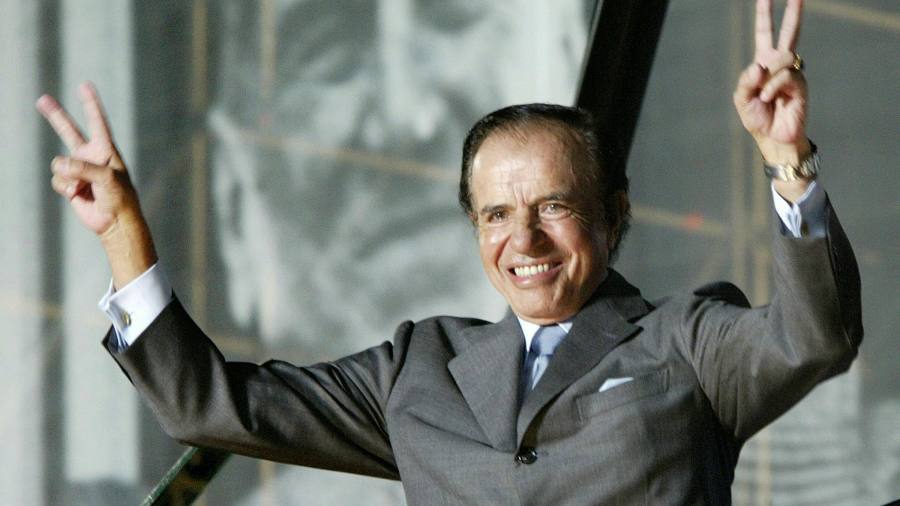[ad_1]
Carlos Saúl Menem, whose decade-long presidency of Argentina in the 1990s transformed the country, died on Sunday, aged 90.Â
One of Latin America’s best known and most controversial presidents, who had a flamboyant lifestyle and sported lamb-chop sideburns, Menem presided over the liberalisation of Argentina’s economy. He wholeheartedly embraced the free-market doctrine enshrined in the “Washington consensus†more than any other leader in the region.
The charismatic leader unexpectedly swept to power in 1989 after the presidency of his predecessor Raúl AlfonsÃn was cut short during a hyperinflation crisis, swiftly stabilising the economy with a bold economic plan. But he departed the presidency in 1999 leaving behind him a flawed and deteriorating economy that ultimately collapsed in Argentina’s 2001 financial crisis.Â
Rising to power as a typical regional “caudillo†(strongman) governing the remote Andean province of La Rioja, Menem reinvented Argentina’s populist Peronist party. He led its return to power after it was ousted in a 1976 military coup, two years after the death of founder Juan Perón.Â
Argentina’s longest-serving president brought an unprecedented but ultimately unsustainable period of price and currency stability to a volatile economy, after introducing a new currency that was effectively pegged to the dollar for a decade.
The economic liberalisation spearheaded by Menem — which contrasts with the foundational principles of Peronism that focus on social justice — triggered a wave of privatisations and an influx of foreign investment in Argentina. Under Menem’s guidance the policy was hailed as a poster child of the freewheeling capitalism of the 1990s.
Menem boasted of “carnal†relations with the US, becoming a golfing companion of President George HW Bush, and re-established diplomatic relations with the UK after the 1982 Falklands War that had precipitated the fall of Argentina’s military dictatorship. He also oversaw the rewriting and modernisation of the constitution, which enabled his re-election in 1995.


He failed in his attempt to regain the presidency in 2003. Despite winning the first round he bowed out after recognising he could not secure enough votes to win because of his high rejection rates.
His defeat ushered in the presidency of another hitherto unknown regional Peronist governor, Néstor Kirchner. The Kirchnerista faction — which frowns on Menem’s legacy to the extent that some Peronists believe it bad luck to utter Menem’s full name out loud — has dominated Argentine politics ever since. Despite her criticisms of Menemism, Kirchner’s wife and successor as president, Cristina Fernández de Kirchner, who is now vice-president, expressed her condolences on Twitter on Sunday.
Elected as a senator in 2005, a post he held until his death, Menem enjoyed congressional immunity that protected him from corruption charges, including a scandal over weapons trafficking to Ecuador and Croatia for which he was sentenced to seven years in prison in 2013. He was also found guilty of embezzlement in 2015.
Menem, who quickly gained a reputation as a playboy and bon vivant, was once criticised for accepting a Ferrari as a gift from local businessmen. “The Ferrari is mine, mine, mine!†he responded. “Why should I give it away?â€
Known as El Turco (“the Turkâ€), for his Syrian immigrant parents, Menem was born in 1930 in the small mountain town of Anillaco, where he built a special runway for the presidential aeroplane. Although his parents were Muslim, Menem converted to Roman Catholicism as an adult.
President Alberto Fernández, whose political career began under Menem, wrote on Twitter: “With profound regret, I learned of the death of Carlos Saúl Menem. Always elected in democracy, he was governor of La Rioja, president of the nation and a national senator. During the dictatorship he was persecuted and imprisoned. All my affection goes to [Menem’s widow] Zulema, [his daughter] Zumelita and all those who mourn him.â€
Menem, who was married twice, had four children, three of whom survive. His eldest son Carlos died in a helicopter accident in 1995, which Menem blamed on Hizbollah.
Many other politicians took to Twitter to commemorate the former president, who died of complications from a urinary tract infection. They emphasised his reformist drive, his natural leadership qualities and his capacity for dialogue and for uniting the country — contrasting with the deep political divisions that exist today.
The government declared three days of national mourning on Sunday.
[ad_2]
Source link






